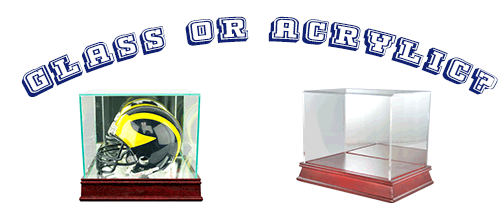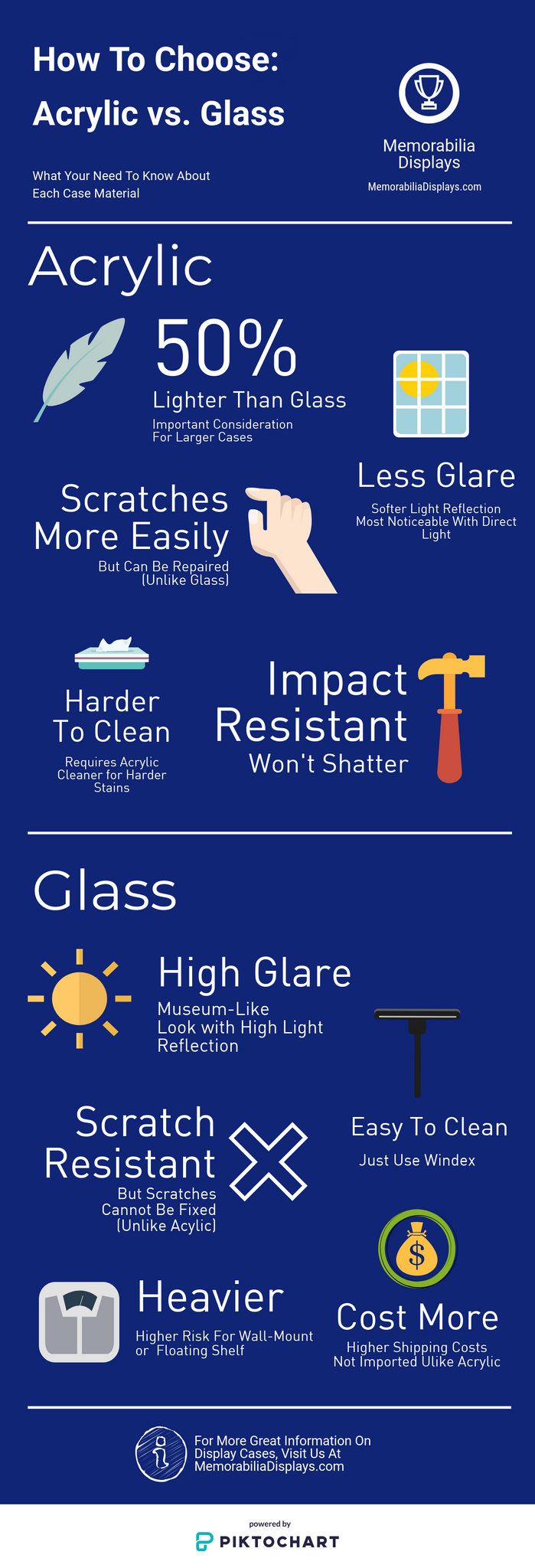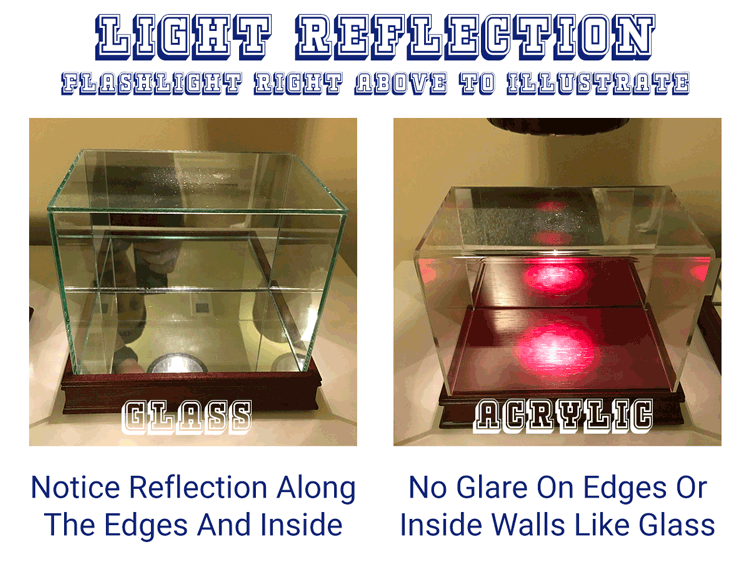
One of the most frequent questions our team at Memorabilia Displays gets is whether we recommend acrylic or glass cases. This isn’t an easy answer as there are pros and cons to each type of case.
I’ll outline the advantages of both so you can make your own decision, however it’s really going to come down to budget and personal preference.
Glass cases are on average 10%-15% more expensive than acrylic because the glass cases we carry are made in the USA and glass costs more to ship. Glass will also be a higher-quality look for your office or man cave.
Some people prefer acrylic because there is a very subtle light reflection, whereas glass reflects 100% light. Acrylic cases weigh 50% less and won’t shatter if you drop it. While acrylic is more prone to scratches, there are solutions to repair it, unlike glass.
At Memorabilia Displays, the majority of our cases are acrylic. Look for the  symbol to see which acrylic and glass cases have a special UV protection additive. All glass cases are guaranteed by the manufacturer.
symbol to see which acrylic and glass cases have a special UV protection additive. All glass cases are guaranteed by the manufacturer.

Acrylic Cases
Pros
-
Weight - Acrylic weighs 50% less than glass. This can make a big difference with larger cases that you want to put on a floating shelf or hang on the wall to avoid them potentially falling if they aren’t properly supported. This is especially important with larger case like jersey display cases, baseball bat display cases or football helmet display cases.
-
Impact Resistant - Acrylic is many times stronger than glass and breaks into large pieces with blunt edges when it shatters, which can be an important safety consideration.
-
Insulation – Acrylic insulates better than glass, causing the inside of the contents to be less susceptible to changing temperatures. This can be a factor in your decision if you have any items that are sensitive to high heat or cool temperatures.
-
Glare – Acrylic has a softer light reflection. If you have spotlights aimed directly at your cases, you will want to go acrylic to avoid too much light reflecting and not being able to see your great collectibles. It’s more of a preference on glare on what you prefer. See bottom of page for example.
-
Fade-Resistant – Acrylic is more fade-resistant than other plastics; the light transmittance is equal to glass while providing the same aesthetic appearance for a reliable, long-term product you can keep on your shelf for years. You don’t have to worry about acrylic turning foggy or dingy.
Cons
-
Can Scratch Easily – The acrylic used in memorabilia cases can scratch easily. The good news is there are inexpensive acrylic polishes that will get your case back to new, such like this Novus Plastic Polish Kit. Most people put their display case up on a shelf and don’t touch or handle it very often, so scratches aren’t necessarily a concern
-
Can be Harder to Clean – Acrylic is more susceptible to getting stains from any grease or oils and needs a little more TLC than glass. With acrylic, avoid using paper towels because they may cause small scratches. Also avoid ammonia-based products, like Windex or other home glass cleaners, because they contain harmful chemicals that may damage the surface and can leave it looking cloudy. For dust or dirt, it is recommended to blot the acrylic case with a wet microfiber cloth, mild soap and warm water or an acrylic cleaner.
Glass Cases
Pros
-
Scratch Resistant – Glass is harder to scratch and additional acrylic sheets can be added with a scratch-resistant coating (hardcoating) which provides even more protection. However, scratches in glass cannot be replaced for fixed.
-
Cleans Easily— Glass cases can be cleaned and dusted with glass cleaner such as Windex and a paper towel or microfiber cloth, with no worry of scratching or damaging it.
-
High-Quality Look— Glass can give a museum-type look which may be preferable, especially if you are showcasing a very high-value item.
Cons
-
More expensive – Molding, extrusion and shipping of glass items are more expensive.
-
Scratches Permanently– While glass is harder to scratch, if you do scratch it, there is no way to fix as you can with acrylic. The only option is to replace it.
-
Glare – Glass will reflect more light back than acrylic. So if you are planning on having lights set up directly on the cases, expect to see more light shine back at you. See below for example.

Resources

![]() symbol to see which acrylic and glass cases have a special UV protection additive. All glass cases are guaranteed by the manufacturer.
symbol to see which acrylic and glass cases have a special UV protection additive. All glass cases are guaranteed by the manufacturer.

Newer Post →